Written
Dec. 18, 2023
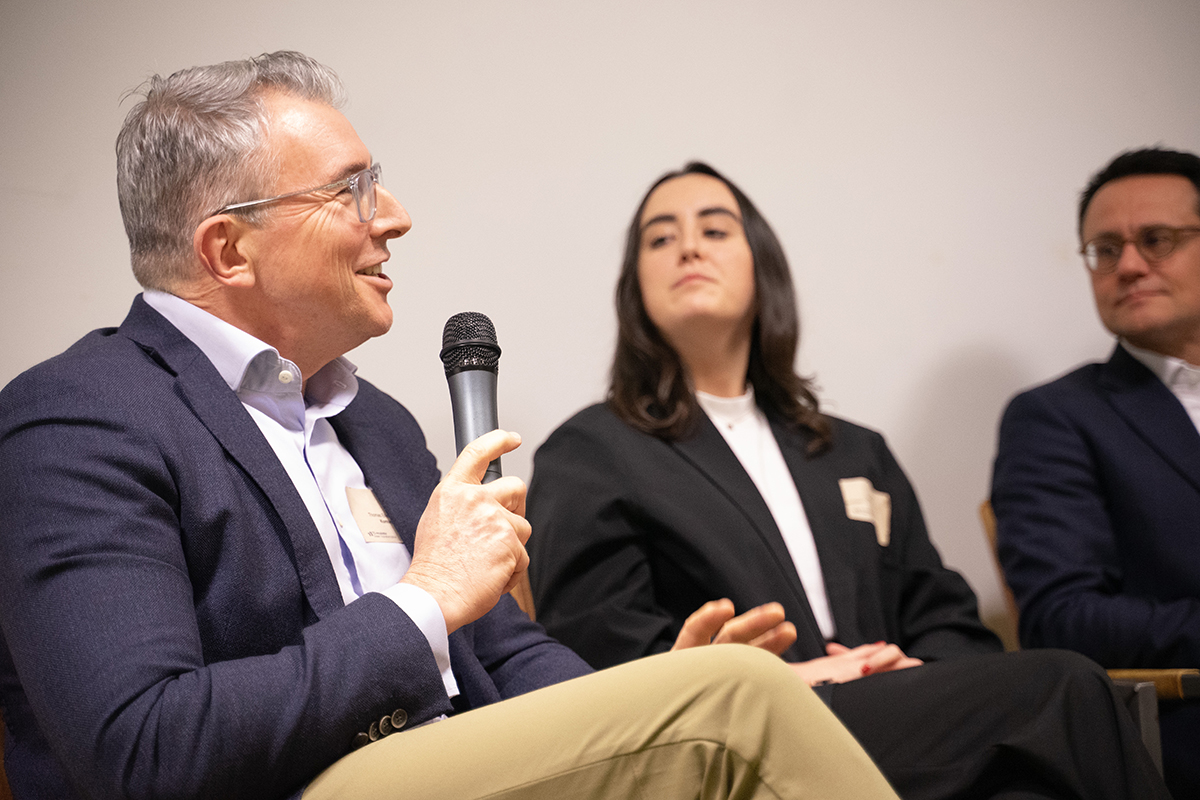
ESG Business Model Panel: Thomas Eitenmüller (Komuno) with Betsey Strader (Visa) and Andreas Feiner (PwC).
Dec. 18, 2023
At the fourth evening event of the Green Transformation Incubator at the TechQuartier Waldstadion, speakers provided insights into designing innovative business models and sales processes. It became clear that the goals of the Green Deal can be better realized in intelligent ecosystems with developed circular economies and digital platforms for granting green loans.
Three Insights:
Collaboration pays off: Shared data infrastructures help exchange ESG data quickly, cost-effectively, and at a high level of quality.
Recommerce offers are gaining importance: 82 percent of Gen Z considers resale value before making a purchase—an increase of more than 100 percent compared to 2021. Simplifying recommerce should be a priority.
Digital municipalities as a driver for sustainability: A market potential of 40 to 50 billion euros is expected for sustainable municipal loans over the next five years. Smart processes promote the exploitation of this potential.
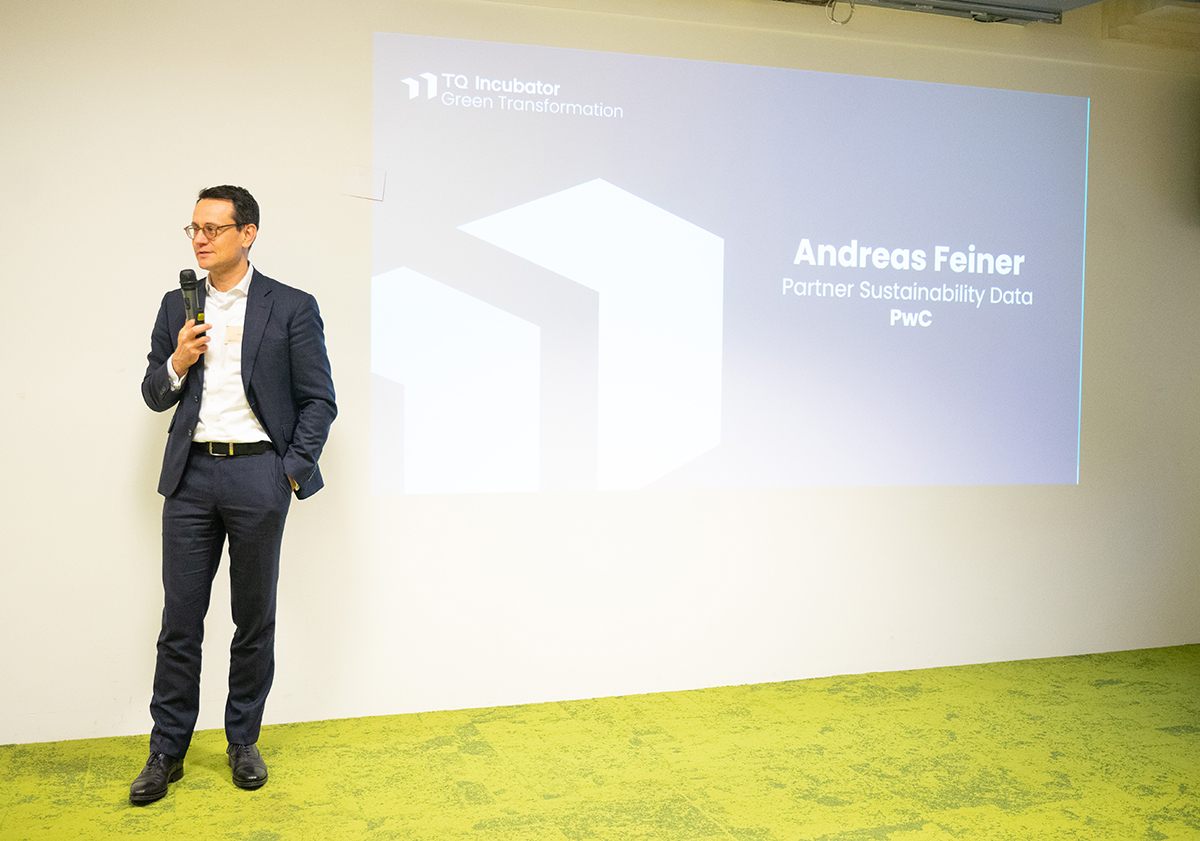
Above: Andreas Feiner from PwC
From the vision of a more sustainable future to a concrete business and sales model – the speakers at the Green Transformation Incubator's fourth evening event before the big demo day on December 13 focused on this crucial step. Andreas Feiner from PwC, Betsey Strader from Visa, Jürgen von der Lehr from ING and Tim Drebold and Lennart Kretschmer from komuno inspired the participants with pioneering concepts on topics such as data management, recommerce and municipal financing.
Moderator Sebastian Schmid, Deputy Editor-in-Chief of Börsen-Zeitung, welcomed Andreas Feiner, Partner Sustainability Data at PwC Germany, as the first speaker. Feiner introduced Dataland, an open-source infrastructure developed by PwC Germany and d-fine, which market participants can use to store and request ESG data.
The infrastructure is embedded in the "Pathway to Paris" project by PwC, WWF, and the German government. Players from the financial sector and the real economy are collaborating to develop strategies for decarbonization. The Frankfurt Werte-Stiftung owns Dataland. The project generates no profits; the costs are shared.
What are the reasons for this approach? "Purchasing data from providers is typically quite expensive. Additionally, there are often restrictive limitations on the purchased data's use. The collaborative approach avoids these problems. Participants gain rapid access to high-quality ESG data and can therefore pursue sustainability goals more consistently," explained Feiner.
During the current twelve-week proof-of-concept phase, companies are invited to test Dataland. "We are keen to see whether the frequently expressed desire for such a solution will be followed by active participation," said Feiner. The system is set to go live in the first quarter of 2024.
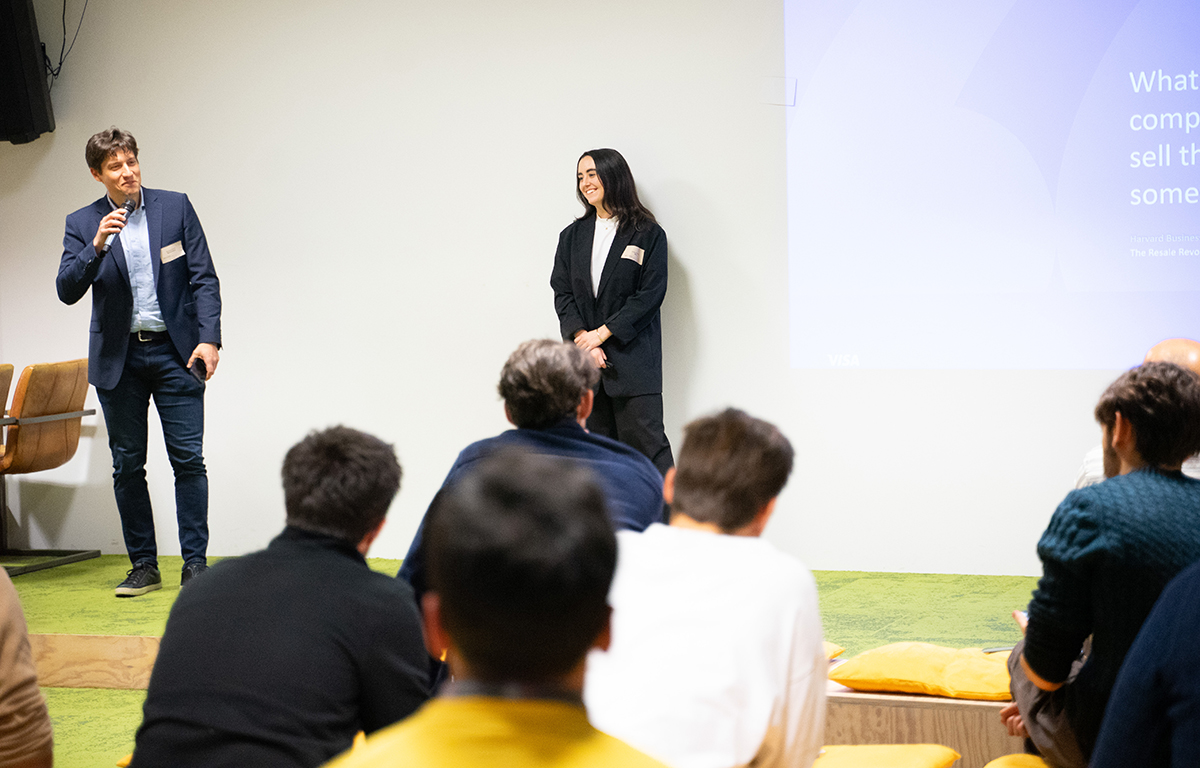
Above: Betsey Strader, Sustainability Solutions Manager at Visa
Betsey Strader, Sustainability Solutions Manager at Visa, also addressed an approach that could pave the way to a more sustainable future: She shared insights on her company's commitment to "recommerce." This includes product-preserving processes such as renting, repairing, reselling, returning, and passing on.
Strader presented significant facts: "In a linear consumer world in which 92% of products are ultimately disposed of and only 8% remain in circulation long-term, a rethink towards a circular economy is essential. Generation Z is acting as a driver here: 82% of this group consider the resale value of a product before buying it, compared to 38% in 2021."
Another impressive fact about the potential of recommerce: "Every US household hoards potentially reusable or saleable goods worth $4,500," said Strader.
Visa strives to promote sustainable consumer behavior by developing optimized payment products and experiences. To drive behavioral change and innovation, the company uses insights from the E-Commerce Insights Behavior Lab, an open-source initiative with other partners.
"Together, we identify potential barriers in recommerce processes. Payment processes should be just as seamless for recommerce as they are for new purchases."
Strader named two important goals in this context: "We want to scale digital payouts from retailers to consumers. Deposit returns or buyback options are often still cumbersomely processed with cash. Secondly, we want to integrate product IDs into the payment journey. The product details stored on a certificate can then be seamlessly transferred to various e-commerce platforms."
Instead of just advising on financial issues, we provide holistic advice. Part of this includes answers to the question of how the ecological transformation affects the share price. We want to support private customers with explaining the individual benefits of a personal energy transition and orchestrating the entire retrofitting process—from heating advice to craftsmanship
From the potential of e-commerce, the spotlight then turned to the sustainability contribution of banks. Jürgen von der Lehr, Head of Sustainability at ING, described the mission of 125 global banks, including ING, in the "Net Zero Banking Alliance." The partners are committed to aligning their loan portfolios towards net-zero emissions by 2050—in Germany by 2045. "CO2-intensive industries such as aviation and cement production are particularly worth watching against this backdrop," said von der Lehr. The estimated investment requirement for decarbonization in Germany is around 240 billion euros per year until 2045.
Von der Lehr defines his company as a "transition bank" that not only finances green projects but also supports customers in decarbonizing their business models.
"Instead of just advising on financial issues, we provide holistic advice. Part of this includes answers to the question of how the ecological transformation affects the share price. We want to support private customers with explaining the individual benefits of a personal energy transition and orchestrating the entire retrofitting process—from heating advice to craftsmanship."
In conclusion, von der Lehr emphasized his bank's responsibility to set a good example to provide credible advice to customers.
"A large part of our CO2 footprint results from data centers and daily commutes, each accounting for 40 percent of the total CO2 footprint. We are therefore actively working on mobility concepts to encourage everyone to use more sustainable means of transportation to get to work."
Local authorities play their part in making sustainable transportation possible by creating the appropriate infrastructure. For the respective projects, they need loans. This is exactly where Tim Drebold and Lennart Kretschmer, Sales Manager Investors and Sales Manager Municipal Customers at komuno, come in. With their startup, founded in 2018, they combine the granting of municipal loans with modern technology.
By implementing systems such as the German Sustainability Code, the Sustainable Development Goals, and the EU Taxonomy, komuno enables transparent sustainable financial reporting. When a loan is tendered via the platform, the local authority first checks the project itself. If it classifies the project as sustainable, an extended self-check with more detailed information or certification is carried out by komuno's partner imug rating. If desired, the investor can request additional information.
"About 760 registered organizations, including 645 municipalities and 115 banks and institutional investors, are proof of our broad acceptance. The 1,000 most indebted municipalities in Germany represent 83 percent of total debt. We currently cover 60 percent of total debt. We are particularly present in North Rhine-Westphalia, Lower Saxony, Bavaria, and Hesse," said Drebold.
Due to their coordinating and motivating function, municipalities already fulfill many criteria for green investments: "We see a market potential of 40 to 50 billion euros in sustainable municipal loans over the next five years," Kretschmer looked ahead.
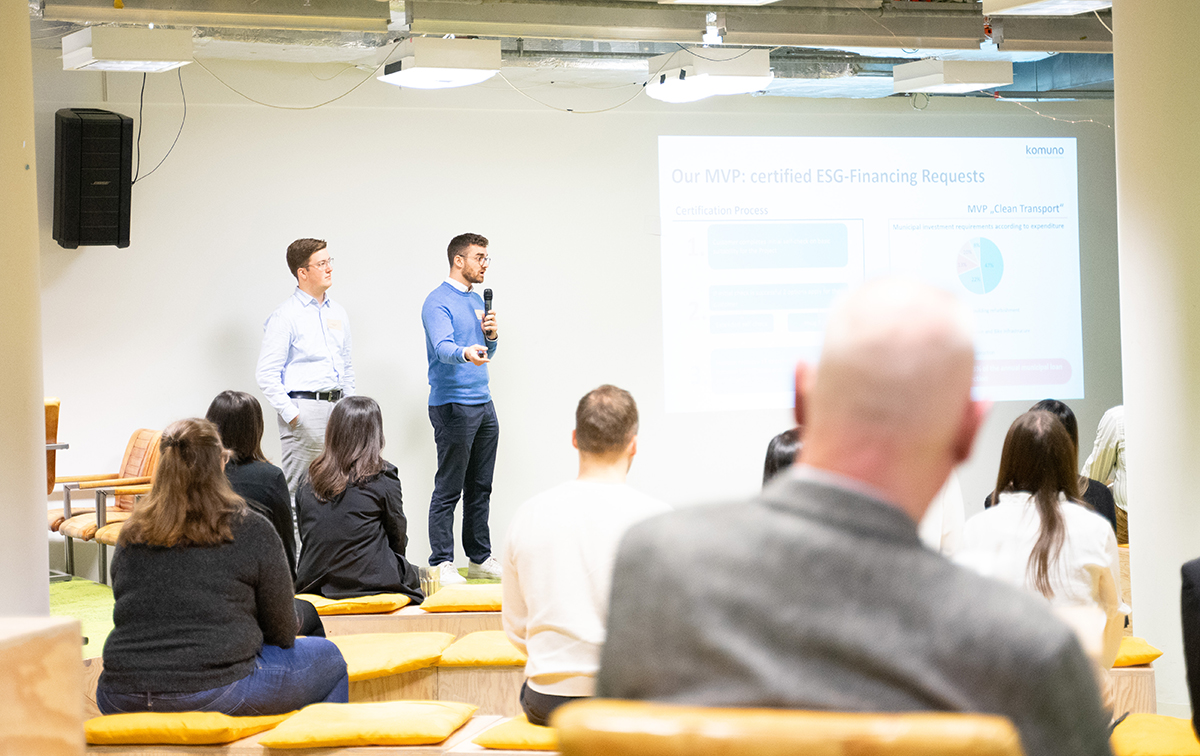
Above: Tim Drebold and Lennart Kretschmer, Sales Manager Investors and Sales Manager Municipal Customers at komuno.
Sebastian Schmid then led to the final panel. He asked about the role of competition and cooperation in exploiting sustainable business potential. "In principle, I see competition as an opportunity: market participants continuously improve their offerings and make technological and sales progress," Eitenmüller recognized.
Andreas Feiner, on the other hand, pointed out that Dataland is based on the idea of cooperation: "The more companies that use the infrastructure, the more added value it creates—at lower costs."
Von der Lehr called on banks to act more cooperatively: "This idea is not very strongly anchored in the DNA of banks. In the past, banks mainly established ecosystems to show that they are capable of doing so. But now it's about the urgent need to make sustainable progress and be bold together."
A meeting with Visa's Chief Sustainability Officer came into Strader's mind: "I was impressed by his message that we should not think in terms of competition when it comes to sustainability measures. Ideally, we should support each other in our environmental efforts within the industry."
Moderator Schmid wanted to know from Strader whether Visa would add a price premium to non-sustainable products to compensate for the negative impact on the climate. "There are different opinions on this within the company, but it is unlikely to be implemented in the short term. From a global perspective, sustainability can hardly be integrated into pricing in a valid way due to a lack of standardized measurement methods." However, Strader does not rule out this step in the future.
Börsen-Zeitung: ING will Potenzial bei Immobiliensanierung heben
Börsen-Zeitung: Die Banken wissen selbst nicht, was sie tun sollen
Börsen-Zeitung: Volumen nachhaltiger Emissionen stagniert
Börsen-Zeitung: ESG-Fintechs beweisen Krisenfestigkeit
More Event Recaps
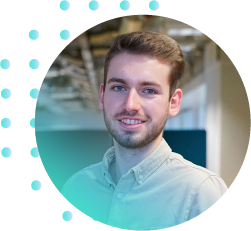
Reach out to Florian for more information and possibilities in our community.